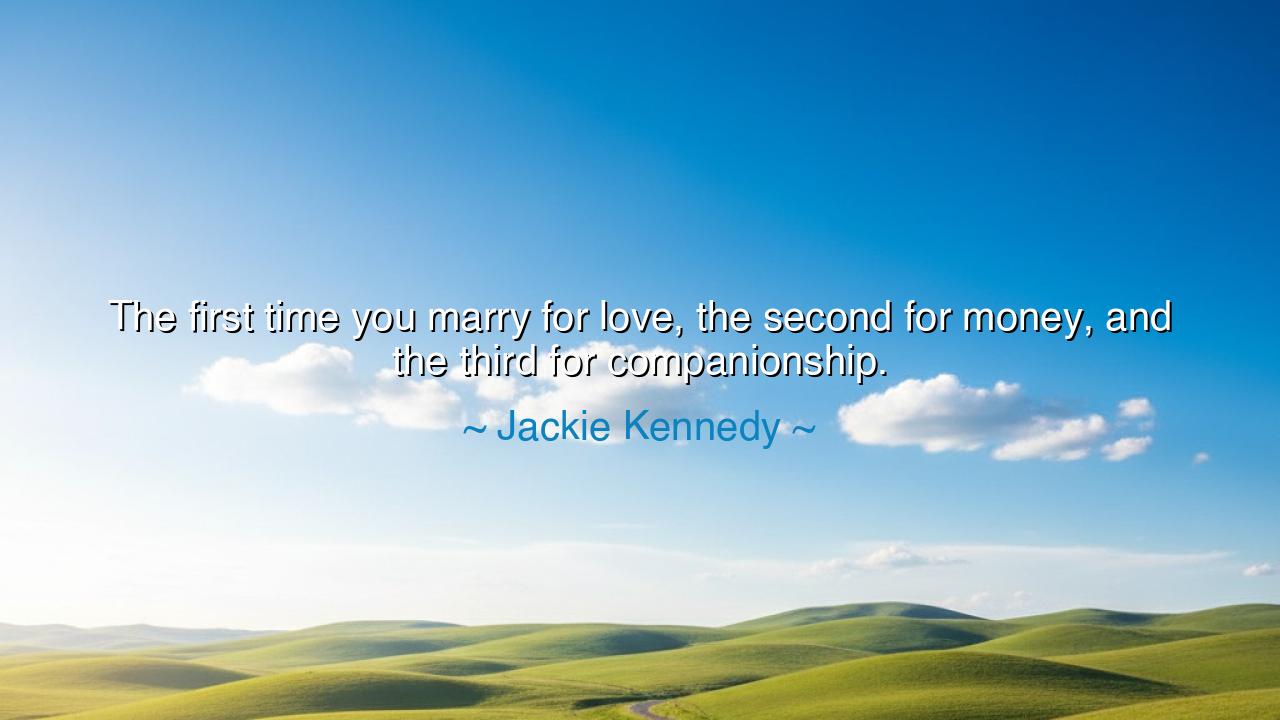
The first time you marry for love, the second for money, and the
The first time you marry for love, the second for money, and the third for companionship.






The words of Jacqueline Kennedy Onassis—“The first time you marry for love, the second for money, and the third for companionship”—are spoken with the quiet elegance of one who lived through all three. Beneath their wit lies the deep wisdom of a woman who understood both the poetry and the price of life. In her words, we hear not cynicism, but experience—a reflection upon how the heart’s desires change as we walk through the different seasons of existence. She, who once symbolized grace and tragedy before the eyes of the world, spoke with the voice of one who had loved greatly, lost deeply, and learned the bittersweet art of survival.
The origin of this quote is drawn from the life of Jackie Kennedy herself, who first married John F. Kennedy, the young senator who would become President and a symbol of hope. That union was the marriage of love and destiny, full of passion, brilliance, and promise. Yet it was also marked by pain and loss—the weight of public life, the strain of infidelity, and the shattering tragedy of assassination. Her second marriage, to Aristotle Onassis, the Greek shipping magnate, was one of security and protection. Having lost so much, Jackie sought not romance, but stability—a fortress against the chaos of the world. And in her later years, beyond the glare of fame, she found peace in companionship, in quiet friendships and family, far removed from the stage of history. Her words, therefore, were not jest, but confession—the confession of a soul that had seen love’s beauty and its impermanence.
To say one marries first for love is to speak of youth—the time when passion blinds us and the heart rules reason. In the first marriage, one dreams of eternity, of souls entwined beyond the reach of time. The young believe that love alone can conquer all things, and perhaps for a moment it does. But life, ever the teacher, reveals that love, though sacred, cannot shield us from circumstance. As the years pass, we learn that passion must be joined by endurance, and affection by understanding. Those who marry only for love often awaken to the truth that the heart, though noble, cannot build a home on dreams alone.
The second marriage, as Jackie observed, is often for security—not always for wealth in the literal sense, but for the safety and steadiness that love once promised but did not sustain. After the storms of the first, people often seek shelter: a partnership of reason rather than of fire. Here, one values prudence, respect, and comfort—the quiet stability of shared purpose over the wild dance of emotion. Some call this practical; others call it cold. Yet, as the ancients knew, wisdom often grows from disappointment, and those who have suffered much learn to measure life by peace, not passion.
But the third marriage—ah, this is the marriage of companionship, the union that transcends both passion and pragmatism. It is the joining of two souls who have walked through fire and emerged humbled yet whole. Here, love is neither storm nor shield—it is a calm hearthfire, glowing quietly in the twilight of life. There are no illusions left, but neither is there bitterness. This is the love of those who have known both joy and sorrow, who have tasted the fragility of the human heart and still choose to share it. In this final stage, companionship becomes the highest form of love—born not of need or desire, but of understanding and acceptance.
Consider, then, the story of Eleanor Roosevelt, who endured the trials of a complex marriage marked by betrayal and distance. When she could no longer find fulfillment in romance, she found it in purpose—building a life of service and friendship that nourished her soul. Like Jackie, she learned that love’s form may change, but its essence remains: the longing to connect deeply with another being, whether in marriage or in shared mission. Both women, born into privilege yet tempered by sorrow, discovered that love evolves with time, and that every stage of it teaches us a different truth.
The lesson, therefore, is not to scorn love’s changing nature, but to embrace its transformation. Life moves in cycles: in youth, we seek fire; in maturity, we seek foundation; in later years, we seek peace. Each stage has its own dignity and wisdom. To cling to one form of love while the soul is ready for another is to resist the rhythm of life itself. As the ancients taught, all things must ripen, and even love must age gracefully.
So, my child, remember this teaching: marry first with your heart, then with your mind, and finally with your soul. Seek love, but let wisdom guide it. Do not chase wealth, but learn to value security. And when life humbles you, open your heart to the quiet joy of companionship—the gentle laughter, the shared silence, the peace of being understood. For in the end, it is not the first flame nor the second shelter that endures, but the steady light of friendship and forgiveness, glowing in the twilight of life.






AAdministratorAdministrator
Welcome, honored guests. Please leave a comment, we will respond soon